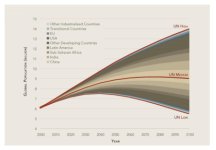DrZoidberg
Contributor
How can numbers of people be disentangled from other issues such as the effects of human activity? More people equals more pollution and damage to the environment. It doesn't have to be that way. In theory we could have twice as many people if on average they all drastically reduced their carbon footprint or what have you, but that's a hypothetical. In reality, more people is creating and has created more pollution and damage and as a result, it seems we are on course for something not very nice.
Sorry, but I'm still not getting this objection to citing population as a factor. I agree it can be overstated, yes, and that it's not easy to do something about and that because of that we might be better focusing on other countermeasures, but surely it's just a matter of emphasis and we could be promoting both or all?
There's a problem with this view. It's a bit pie in the sky. The 20'th century is full of social experiments of the type "if only everybody would be doing this instead, everything would be so much better". Hunter gatherers adorned their bodies with feathers of rare birds, of with carved bone, of a bone that was super hard to carve in, and danced complicated dances to out dance the others. Humans are basically the same today. But now it's Rolex watches, drive SUV's that run on nothing but endagered owls, and tastes for music where nobody has heard of the bands. This is an intrinsic part of human psychology. It doesn't matter how great it would be if people would be better off not doing this, unless there's a mechanic by which to have higher status than others, nobody is going to care. The nice thing about capitalism is that it's the most superior system to cater to our bodily needs and comfort. But a side effect of capitalism is that we gain status through consumerism. Unless you fix that, nothing is going to change.
I'm a lefty, so I hang out with "environmentally conscious" people. They're not. Environmentalism has just become yet another method by which to gain status. I know a woman who lives in a huge house in the country, drives a car everywhere, has dreadlocks, is super fixated about recycling. That's what environmentalism looks like today. It's just total bullshit.
We're nowhere. We need to cater to incentives that actually work on humans. We've yet to solve that problem.

